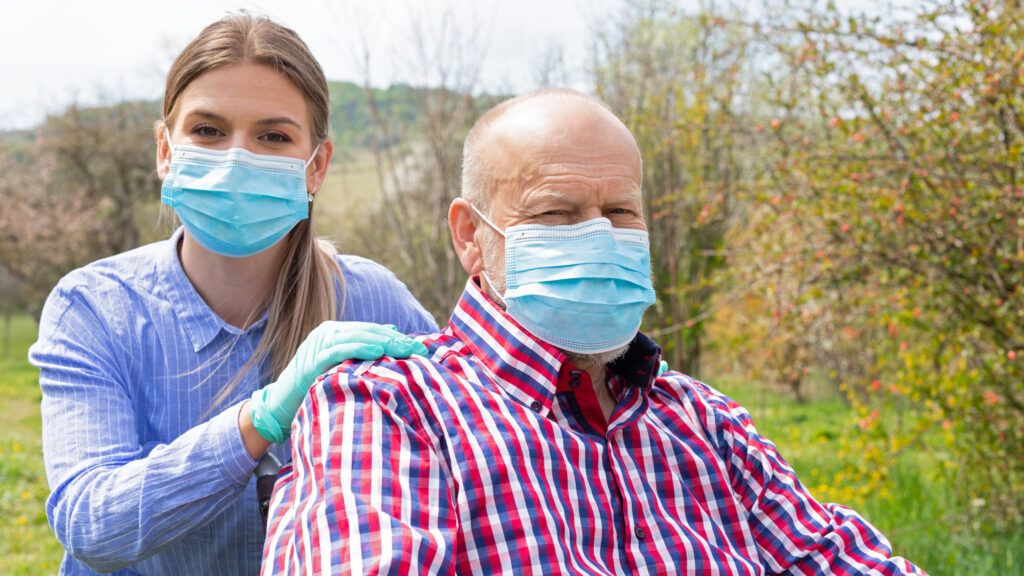Michelle Palmer is the Center for Research and Education’s Sales and Marketing Associate at Benjamin Rose Institute on Aging
A big chunk of your time each week may be devoted to helping out your loved one. Maybe you drive to healthcare appointments or the grocery store. Maybe you’ve taken on the cooking and laundry. You may lend a lot of emotional support or keep track of and dispense medications. If any of this describes you, there’s a good chance that you’ve become a caregiver. But do you see yourself that way? If not, you’re not alone. According to an AARP Caregiver Identification study, a mere 19 percent of caregivers in the U.S. are willing to self-identify as such.
You may not want to identify as a caregiver for any of several reasons. Placing that label on yourself could be an indication that your loved one has a serious condition or disease that requires more care than you’re willing to accept is the case at this point.
The caregiver label also comes with a great deal of responsibility. Common as the role may be, most people don’t expect to actually become family caregivers. Shifting from the role of “helpful daughter” or “loving wife” to “caregiver” is a leap that can be tough to handle.
So what difference does it make? Does it change anything when you acknowledge that you’ve taken on a caregiver role? The answer is yes, and this is the reason: Self-identifying as a caregiver can do much to help ease the burdens of your important and challenging role!
Identifying as a caregiver can boost your confidence
Those who self-identify as caregivers are more apt to search out and utilize available community and healthcare resources. This can have positive stress-reducing effects and can assist caregivers and their loved ones in getting the help they require.
According to one research study, “affiliating oneself as a family caregiver appears to have positive benefits which include promoting effective use of community support services and creating a sense of belonging and connection to a broader community.”
It makes sense that caregivers who identify as such would be more likely to become part of the greater community of caregivers. This can lead to better connection with individuals and resources that provide assistance, including support groups, respite services and educational offerings.
In another study, 83 percent of self-identified family caregivers said that once they started to think of themselves as caregivers, it gave them an increased sense of confidence when talking to healthcare professionals about their loved one’s care.
And over 90 percent of family caregivers said that they became more proactive about seeking resources and skills they need to assist their care recipient after they self-identified, according to a National Family Caregivers Association survey. When you self-identify as a caregiver, you can become more self-assured, which can help enable your loved one to get the greatest care possible.
How to determine whether you’re a caregiver
It can be beneficial to you to determine whether you’re actually a caregiver. Consider whether you handle any of these typical caregiving tasks:
- Personal care: Assisting with bathing, grooming, toileting, exercise, etc.
- Meal preparation: Buying groceries and cooking
- Running errands: Retrieving medications at the pharmacy, driving to appointments
- General care: Organizing and dispensing medications, scheduling doctor’s visits
- Emotional support: Being a shoulder to lean on and a positive force
- Health monitoring: Checking vitals, tracking health changes, acting as a medical liaison
It’s likely that you have stepped into the role of caregiver if you handle a few or the majority of these tasks. The good news is that you can access a variety of support programs to assist you in managing stress and in meeting any other needs that you or your loved one may have. We Care. . . Because You Do is a telephone – and email-based care coordination program for individuals caring for an older loved one with chronic health conditions that provides you with simple, practical solutions and ongoing guidance to empower you to manage care and decision-making throughout your caregiving experience.
Acknowledging the caregiving role can make you feel better!
Identifying as a caregiver can also help you to see that you are valuable. It can benefit you psychologically by boosting your feelings of fulfillment and satisfaction. Just over half of caregivers surveyed in the AARP 2020 Caregiving in the U.S Report indicated that their role has given them a sense of purpose in life.
You may begin to see yourself as a caregiver at any stage in the journey with your loved one, and it can be sudden or gradual. For some, it happens naturally as the result of a health crisis or accident, since such events bring up well-defined care requirements.
For others, a loved one’s diagnosis and the resulting interaction with the health care system made them aware that they were family caregivers, according to a survey from the National Family Caregivers Association. But for over 75 percent of family caregivers, it was the act of helping their loved one with personal care that contributed significantly to their self-identification.
Regardless of circumstances, helping a family member or friend to acknowledge the crucial caregiving role he or she plays in a loved one’s life can lead that person to valuable support services, and that can have enormously positive psychological benefits.





